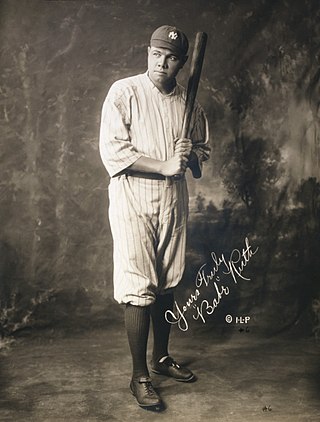
George Herman "Babe" Ruth was an American professional baseball player whose career in Major League Baseball (MLB) spanned 22 seasons, from 1914 through 1935. Nicknamed "the Bambino" and "the Sultan of Swat", he began his MLB career as a star left-handed pitcher for the Boston Red Sox, but achieved his greatest fame as a slugging outfielder for the New York Yankees. Ruth is regarded as one of the greatest sports heroes in American culture and is considered by many to be the greatest baseball player of all time. In 1936, Ruth was elected to the Baseball Hall of Fame as one of its "first five" inaugural members.

The Boston Red Sox are an American professional baseball team based in Boston. The Red Sox compete in Major League Baseball (MLB) as a member club of the American League (AL) East Division. Founded in 1901 as one of the American League's eight charter franchises, the team's home ballpark has been Fenway Park since 1912. The "Red Sox" name was chosen by the team owner, John I. Taylor, c. 1908, following the lead of previous teams that had been known as the "Boston Red Stockings", including the Boston Braves. The team has won nine World Series championships, tied for the third-most of any MLB team, and has played in 13 World Series. Their most recent World Series appearance and win was in 2018. In addition, they won the 1904 American League pennant, but were not able to defend their 1903 World Series championship when the New York Giants refused to participate in the 1904 World Series.

"Yankee Doodle" is a traditional song and nursery rhyme, the early versions of which predate the Seven Years' War and American Revolutionary War. It is often sung patriotically in the United States today. It is the state song of the U.S. state of Connecticut. Its Roud Folk Song Index number is 4501.

Harry Herbert Frazee was an American theatrical agent, producer, and director, and owner of Major League Baseball's Boston Red Sox from 1916 to 1923. He is well known for selling Babe Ruth to the New York Yankees, which started the alleged Curse of the Bambino.

The Curse of the Bambino was a superstitious sports curse in Major League Baseball (MLB) derived from the 86-year championship drought of the Boston Red Sox between 1918 and 2004. The superstition was named after Babe Ruth, colloquially known as "The Bambino", who played for the Red Sox until he was sold to the New York Yankees in 1920. While some fans took the curse seriously, most used the expression in a tongue-in-cheek manner.

George Michael Steinbrenner III was an American businessman who was the principal owner and managing partner of Major League Baseball's New York Yankees from 1973 until his death in 2010. He was the longest-serving owner in club history, and the Yankees won seven World Series championships and 11 American League pennants under his ownership. His outspokenness and role in driving up player salaries made him one of the sport's most controversial figures. Steinbrenner was also involved in the Great Lakes and Gulf Coast shipping industry.

David Brian Cone is an American former Major League Baseball (MLB) pitcher, and current color commentator for the New York Yankees on the YES Network and Amazon Prime as well as for ESPN on Sunday Night Baseball. A third round draft pick of the Kansas City Royals in the 1981 MLB draft, he made his MLB debut in 1986 and continued playing until 2003, pitching for five different teams. Cone batted left-handed and threw right-handed.

Vernon Louis "Lefty" Gomez was an American professional baseball player. A left-handed pitcher, Gomez played in Major League Baseball (MLB) between 1930 and 1943 for the New York Yankees and the Washington Senators. Gomez was a five-time World Series champion with the Yankees. He was also known for his colorful personality and humor.

Jason Andrew Varitek, nicknamed "Tek", is an American professional baseball coach and former catcher. He is the game planning coordinator, a uniformed coaching position, for the Boston Red Sox. After being traded as a minor league prospect by the Seattle Mariners, Varitek played his entire 15-year career in Major League Baseball (MLB) for the Red Sox. A three-time All-Star and Gold Glove Award winner at catcher, as well as a Silver Slugger Award winner, Varitek was part of both the 2004 World Series and 2007 World Series Championship teams, and was viewed widely as one of the team's leaders. In December 2004 he was named the captain of the Red Sox, only their fourth captain since 1923. He was a switch-hitter.

Jack Kent Cooke was a Canadian-American businessman in broadcasting and professional sports. Starting in sales, Cooke was very successful, eventually becoming a partner in a network of radio stations and newspapers in Canada. After failing at starting a major league baseball team in Toronto and being turned down to own a television station in Toronto, Cooke moved to the United States and built a business empire in broadcasting and professional sports franchises.

Brian McGuire Cashman is an American baseball executive for the New York Yankees of Major League Baseball. He has served as the general manager and senior vice president of the Yankees since 1998. During Cashman's tenure as general manager, he inherited a core that was built by Gene Michael and Bob Watson and the Yankees have won seven American League pennants and four World Series championships.

Frank H. McCourt Jr. is an American business executive and philanthropist. As of 2023, he is the executive chairman and former CEO of McCourt Global, owner of the football club Marseille and founder and executive chairman of international non-profit Project Liberty. He was the owner and chairman of the Los Angeles Dodgers and Dodger Stadium from 2004 to 2012.

Thomas Charles Werner is an American television producer and businessman. Through his investment in Fenway Sports Group, he is currently chairman of both Liverpool Football Club and Boston Red Sox.

WBIX branded Nossa Rádio USA is a commercial Brazilian Portuguese radio station licensed to Boston, Massachusetts, serving Greater Boston. Owned by the International Church of the Grace of God, the WBIX studios are located in the Boston suburb of Somerville, while the station transmitter resides in Quincy, on the southern banks of the Neponset River near the Southeast Expressway. Besides its main analog transmission, WBIX is available online.
Dan Duquette is an American baseball executive. He is the former general manager of the Montreal Expos, Boston Red Sox, and Baltimore Orioles of Major League Baseball. He is also the founder of the Dan Duquette Sports Academy. He has twice been named the Major League Baseball Executive of the Year by Sporting News.

Daniel Reid Topping was a part owner and president of the New York Yankees baseball team from 1945 to 1964. During Topping's tenure as chief executive of the Yankees, the team won 14 American League pennants and ten World Series championships.

The Babe is a 1992 American biographical sports drama film about the life of famed baseball player Babe Ruth, who is portrayed by John Goodman. Directed by Arthur Hiller, written by John Fusco, it was released in the United States on April 17, 1992, to mixed reviews. The somewhat fictionalized account of Ruth's life begins in Maryland with his childhood. The film covers his personal life and rise as a ball player with the Red Sox, trade to New York, and decline in health and career that ends with his walking away after being a "name only" manager to boost ticket sales.

Irving Darius Hadley was an American professional baseball pitcher who played in Major League Baseball. Born in Lynn, Massachusetts, he played in the major leagues for the Washington Senators, Chicago White Sox (1932), St. Louis Browns (1932–34), New York Yankees (1936–40), New York Giants (1941), and Philadelphia Athletics (1941).
Henry George Steinbrenner III was an American businessman who was a part owner and co-chairman of the New York Yankees of Major League Baseball (MLB). He was the older brother of the team's principal owner and managing general partner Hal Steinbrenner.

Fisher Potter Hodas is a law firm based in West Palm Beach, Florida. It specializes in the divorces of billionaires, CEOs, and major sports figures. The firm's work in international asset recovery was chronicled in The New York Times investigative story "How to Hide $400 Million," written by Nicholas Confessore.


















